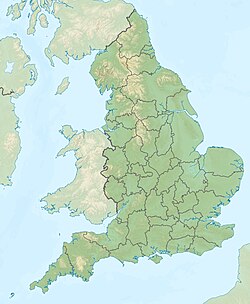
Back Kingston upon Hull AN Cyngestūn on Hul ANG كينغستون أبون هال Arabic كينجستون ابون هال ARZ Kingston upon Hull AST Kinqston-apon-Hall Azerbaijani کینقستون آپون هال AZB Кінгстан-апан-Хал Byelorussian Кінгстан-апон-Гал BE-X-OLD Кингстън ъпон Хъл Bulgarian
Kingston upon Hull, usually shortened to Hull, is a port city and unitary authority area in the East Riding of Yorkshire, England.[2] It lies upon the River Hull at its confluence with the Humber Estuary, 25 miles (40 km) inland from the North Sea and 37 miles (60 km) south-east of York, the historic county town.[2] With a population of 266,463 (2021), it is the fourth-largest city in the Yorkshire and the Humber region after Leeds, Sheffield and Bradford.
The town of Wyke on Hull was founded late in the 12th century by the monks of Meaux Abbey as a port from which to export their wool. Renamed Kings-town upon Hull in 1299, Hull had been a market town,[3] military supply port,[4] trading centre,[5] fishing and whaling centre and industrial metropolis.[4] Hull was an early theatre of battle in the English Civil Wars.[5] Its 18th-century Member of Parliament, William Wilberforce, took a prominent part in the abolition of the slave trade in Britain.[6]
More than 95% of the city was damaged or destroyed in the blitz and suffered a period of post-industrial decline (social deprivation, education and policing).[7] The destroyed areas of the city were rebuilt in the post–Second World War period.[8] In the early 21st century spending boom before the late 2000s recession the city saw large amounts of new retail, commercial, housing and public service construction spending.
In 2017, it was the UK City of Culture and hosted the Turner Prize at the city's Ferens Art Gallery.[9] Other notable landmarks in the city are the Minster, the tidal surge barrier, the Paragon Interchange and The Deep aquarium. Areas of the town centre include the old town (including its museum quarter) and the marina. Hull University was founded in 1927 and had over 16,000 students in 2022.[10] Rugby league football teams include clubs Hull F.C. and Hull Kingston Rovers. The city's association football club is Hull City (EFL Championship). Hull RUFC and Hull Ionians both play in the National League 2 North of rugby union.
- ^ UK Census (2011). "Local Area Report – Kingston upon Hull, City of Local Authority (1946157109)". Nomis. Office for National Statistics. Retrieved 1 March 2018.
- ^ a b "Kingston upon Hull". Encyclopædia Britannica Online. 2008. Archived from the original on 5 February 2024. Retrieved 8 July 2008.
- ^ "Brief history of Hedon". Hedon Town Council: Working for You. Hedon Town Council. 2007. Archived from the original on 7 April 2013. Retrieved 25 February 2013.
- ^ a b "History of Hull". Hull City Council. 2007. Archived from the original on 10 January 2008. Retrieved 22 September 2007.
- ^ a b Cite error: The named reference
VCHULLwas invoked but never defined (see the help page). - ^ "Slavery: unfinished business". Wilberforce 2007: Hull. 2007. Archived from the original on 21 September 2007. Retrieved 23 September 2007.
- ^ Parkinson, Michael; Champion, Tony; Evans, Richard; Simmie, James; Turok, Ivan; Crookston, Martin; Katz, Bruce; Park, Alison; Berube, Alan; Coombes, Mike; Dorling, Danny; Glass, Norman; Hutchins, Mary; Kearns, Ade; Martin, Ron; Wood, Peter (March 2006). State of the English Cities: Volume 1 (PDF). London: Office of the Deputy Prime Minister. p. 112. ISBN 978-1-85112-845-7. Archived from the original (PDF) on 27 March 2009. Retrieved 5 March 2009.
- ^ "Hull: A northern coastal town". Historic England. Retrieved 8 May 2022.
- ^ "Turner Prize a 'honeypot' for Hull". BBC News. BBC. 28 May 2015. Retrieved 6 January 2016.
- ^ "About the University of Hull". University of Hull. Retrieved 8 August 2022.
© MMXXIII Rich X Search. We shall prevail. All rights reserved. Rich X Search










